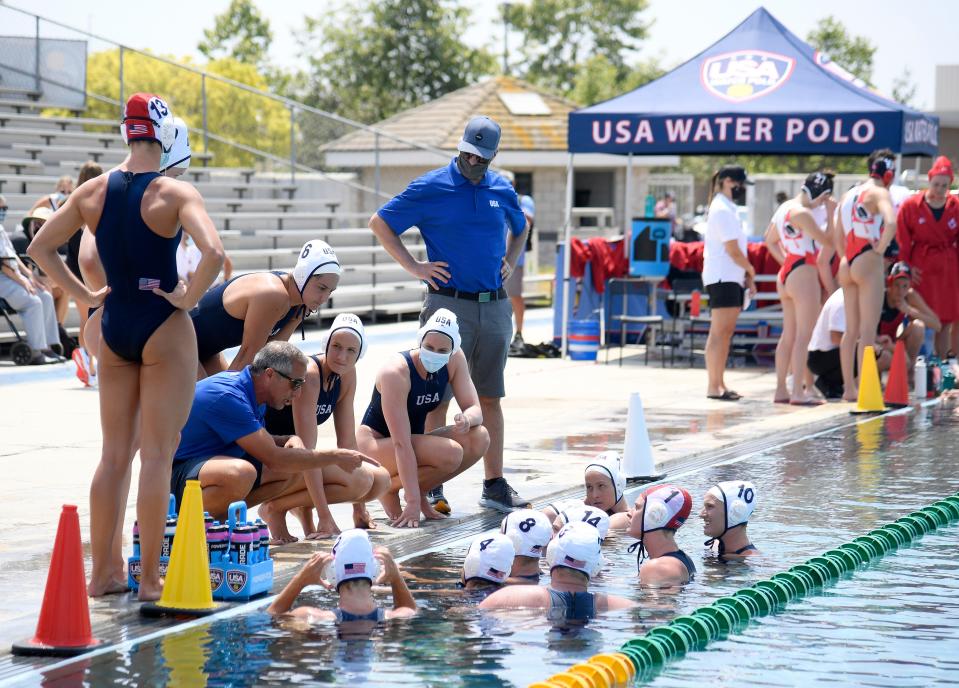Silent retreat helped ready U.S. women's water polo team for Tokyo Olympics
The U.S. women’s water polo team was in the middle of a 69-game winning streak when its head coach, Adam Krikorian, realized he had a problem.
He was running out of ways to challenge his team.
So in September 2019, Krikorian took the players on a seven-day silent retreat.
No phones.
No social media.
And absolutely no talking.
“In my opinion, that was as nervous as they’ve ever been before, including gold medal games and world championship finals,’’ Krikorian told USA TODAY Sports. “On the eve of that day, of going into that period of silence, it was terrifying.’’
It was calculated.
With Krikorian looking ahead to the Tokyo Games, members of a team that has won two consecutive Olympic gold medals and three consecutive world championships headed to Bison Peak, Colorado, where the players and coaches slept in tepees.
No room service, cable TV or housekeeping.
“Adam wanted to put us in an adverse situation,’’ said Maggie Steffens, the team’s captain. “He wanted to put this team in a situation that we’ve never been through before, and it worked.
“I mean, it was scary. We all were nervous heading into it. But it was really rewarding. It was a shared experience, shared adversity that we had to overcome together.’’

For almost a decade, Krikorian resisted the idea of a silent retreat, recommended by Peter Haberl, a senior sport psychologist for the United States Olympic Committee. Haberl was pushing in a new direction.
He introduced the practice of mindfulness, which according to Psychology Today is “a state of active, open attention to the present. This state is described as observing one’s thoughts and feelings without judging them as good or bad.’’
Russia barred from Tokyo Olympics: But punishment is effectively in name only
Inside the Olympic Village: What's life like for athletes in Tokyo?
The water polo team began meditating as a group and it has continued to do so, for about 20 minutes twice a week.
“Some of the practices we do and the mindfulness exercises we do, I thought were a bit over the top,’’ said Krikorian, who took over as head coach in 2009. “But I’ve become a true believer in the importance of mindfulness and being present and being aware and noticing your thoughts. I finally agreed to an idea that (Haberl) had of going on a silent retreat.’’
It came as little surprise to Melissa Seidemann, a stalwart defender who played for the U.S. teams that won the Olympic gold medal in 2012 and 2016.
“Our coach believes that we should leave no stone unturned,’’ she said. “So any stone that needs to be flipped, we turn it.’’
Mindfulness is used to reduce stress, and the potential payoff for the water polo team is supposed to come in the pool.
The hope: Using mindfulness to deal with the discomfort of seven days of silence will give the Americans the ability to deal with any discomfort during the Olympic competition, which begins July 24 and ends Aug. 7.
“We wanted to prepare for being uncomfortable at the Games,’’ Haberl said of the silent retreat. “When you always win, you get very comfortable.’’
The Americans are heavy favorites, but they are not invincible. Their 69-game winning streak came to an end in January 2020 with a 10-9 loss to Australia.
In addition to their collective talent, the U.S. players will be expected to draw on self-observation, self-awareness and other mindfulness techniques — especially in tense situations.
“What happens to the mind?’’ Haberl said. “Can you be aware of it? Can you be open to that? And then can you come back and just be present?
“We’re trying to prepare for the Games when that moment comes, when the team is being challenged and discomfort comes up. Can they (handle) it?’’
This article originally appeared on USA TODAY: Olympics prep for US women's water polo team included silent retreat

